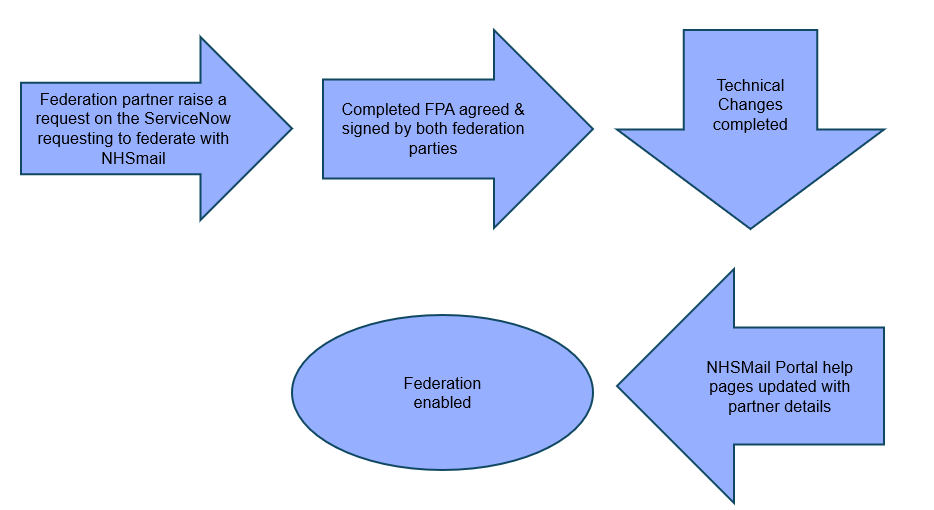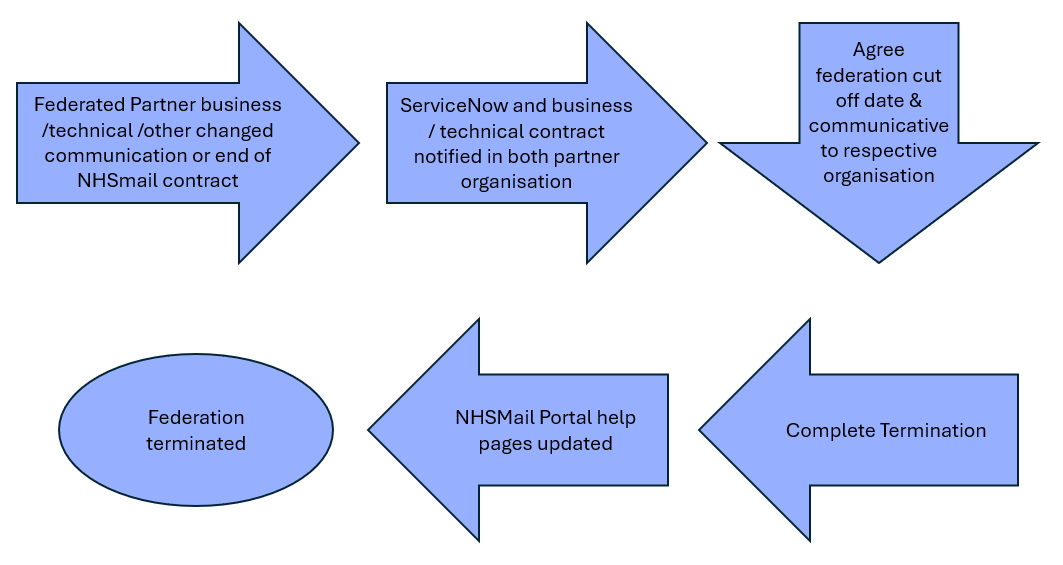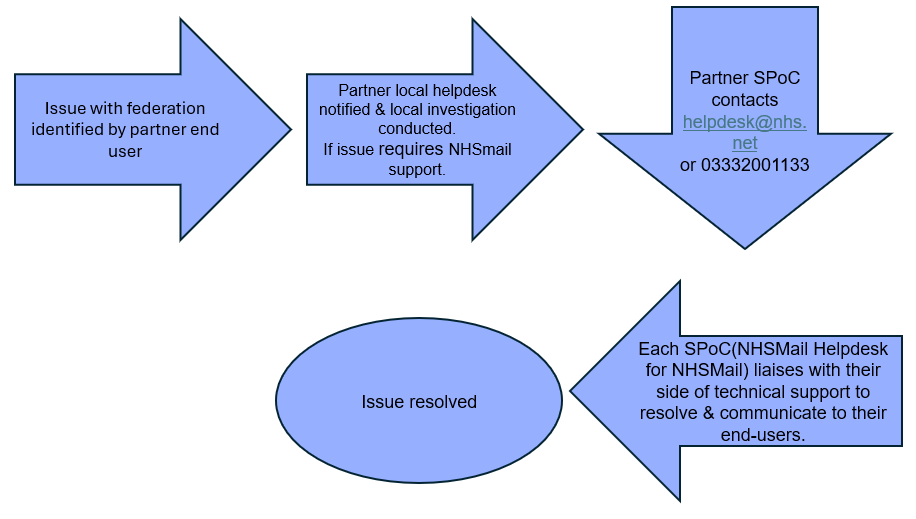Introduction
This document provides organisations, seeking to federate with NHSmail Calendar, with a list of common questions and answers on federation. The document also provides a summary of the on-boarding, support and disconnection (de-federation) processes.
Overview
The NHSmail service has been designed to enable interoperability with third-party systems. NHSmail Calendar is one key area of the service where interoperability holds significant value in enabling collaboration across health and social care:
-
- NHSmail Calendar federation enables NHSmail users to view free and busy information within the calendar between users in a partnering organisation that has federated calendars.
- Federated contacts can only view, by default, the free and busy information within the calendar. The individual users can opt to share increased visibility to make the location and subject fields within their calendar available if they choose to.
- Calendar federation is controlled by security configurations that must be reciprocated between NHSmail and partnering organisations.
For guidance, FAQs and technical information on how to federate with NHSmail, please refer to Federation and synchronisation
- NHSmail Calendar federation requires the consent and correct configuration of both parties of the federated relationship, which will need to be completed by the Microsoft Exchange system administrators; Accenture on behalf of NHS England.
- Currently, federation with NHSmail is only being offered to those organisations operating in a health and care setting, for example, local authorities, publicly funded health services, pharmacies etc.
- NHSmail Calendar federation will only be offered to health and care organisations operating with Microsoft Exchange 2010 SP3 or higher.
Terminology
Interoperability – the ability of computer systems or software to exchange and make use of information.
Federation – functionality which allows users to communicate with others outside their organisation.
Authorised signatory – officer or representative vested (explicitly, implicitly, or through conduct) with the powers to commit the authorising organisation to a binding agreement.
Federation partner & Partner – organisation with which calendar federation / sharing is enabled between.
Federation Partnership Agreement (FPA) – a formal document agreeing the federation between the partner organisations.
Domain Name System (DNS) – the Internet’s system for converting alphabetic names into numeric IP addresses.
De-federation – the process of disconnecting the link to NHSmail calendar federation service.
End-user – user of the calendar service.
Single Point of Contact (SPoC) – a person or department serving as the co-ordinator or focal point of information, concerning an activity or program. For calendar federation, the SPoC is each organisation’s local helpdesk purposed for providing IT support.
Guidance and process flows to federate / de-federate
High-level federation process for NHSmail Calendar
Organisations wishing to federate with the NHSmail Calendar service must demonstrate that they:
- work in a health and care environment and the system will be used for such purposes
- hold a level of information governance maturity
- will confirm by signing up to the federation partnering agreement that organisations hold an appropriate level DSPT or an equivalent e.g. PSN CoCo.
Organisations should read the Calendar federation section later in the document, to understand the requirements for federation.
The above will be demonstrated by signing and accepting the terms set out in the Calendar Federation Partnership Agreement. Process for organisations seeking to federate with NHSmail Calendar:
-
Organisation will be required to raise a request by using ServiceNow. The process starts by completing the NHSmail Calendar Federation Partnership Agreement (FPA), completing the blank fields on ServiceNow request and attaching agreement to ServiceNow form.
Both documents can be downloaded from the following links:
- Once the request is received, NHSmail will review it. If approved, the request will be forwarded to the Accenture technical team, who will begin the configuration process. Upon completion, the Accenture team will inform the requestor when the calendar federation is enabled. If any concerns are identified during submission of the paperwork, they will be communicated back to the federation partner.
Please note: All federation requests approved for implementation will be processed on the 7th and 21st of each month, with the change taking up to 10 days.
- Upon enablement, the NHSmail technical contact will liaise with the federation partner’s technical contact to perform testing to ensure the service is operational.
- Upon successful federation, NHSmail will publish details of federated organisations on the NHSmail Portal help pages, including the name of the organisation, date federated and the federated partner’s statement on their intended use of the federation service.
Process representation for federation
High level de-federation process from NHSmail Calendar
Once federation is in place, there are two ways a federated partner can have their federation suspended or revoked:
- The term of the NHSmail contract with the current NHSmail delivery partner coming to an end which will invoke the process to remove federation services with the federation partner.
- If there is a change in the business, technical or operational infrastructure of the federated partner organisation, for example, if the federated partner ceases to trade, there is a change in ownership, change of name, technology/security change or anything that would require a new application for federation. In the second scenario, for revoking federation, it is the responsibility of the federated partner to notify NHSmail via the ServiceNow within 48 hours of any unplanned changes or issues occurring and within 24 hours of any planned changes being agreed. The appropriate contact identified within the FPA must notify their counterpart within the organisation using NHSmail.
There is no formal requirement for the renewal of an FPA. It is the partner organisation’s responsibility to notify NHSmail to remove federation or of any changes with the partner (in line with the de-federation process outlined) that impact the federation.
Process representation for de-federation
Support model for federated organisations
If issues are experienced with the federation service, such as a partner end-user is unable to access an NHSmail user’s calendar, the partner should:
- Contact the NHSmail user whose calendar they wish to view
- Ask the user to check their calendar settings to ensure shared calendar permissions have been set appropriately.
- Contact their own organisation’s support desk to raise a fault, if access is not blocked.
- The partner’s support desk will provide support in the first instance, using their internal escalation process
- Arrange for their SPoC, using the contacts identified in the FPA, to escalate the issue with the NHSmail national helpdesk, if the investigations by the partner identify that the issue lies with the NHSmail service. The NHSmail helpdesk will follow its standard process to identify and resolve the issue.
NHSmail are only able to investigate issues on the NHSmail side of the connection.
If there is a change in SPoC at the partner organisation, it is the partner’s responsibility to notify NHSmail through helpdesk@nhs.net. Only the identified contacts within the FPA are authorised to request information or support from NHSmail.
Process representation for helpdesk support
Calendar federation
The NHSmail Calendar federation service uses the Microsoft Azure platform to allow safe access to calendars across organisations using Microsoft Exchange 2010 SP3 or newer. The configuration information below supports an organisation in enabling the calendar federation service. The federation will be enabled upon successful approval of the federation partnership organisation.
Governance responsibilities
As with all systems, controls can only go so far, so users should always be aware of their individual responsibilities in relation to information governance and clinical safety. Users must act in accordance with their own organisational governance and clinical safety policies and processes. The NHSmail Acceptable Use Policy (AUP) also provides guidance on calendar federation.
The NHSmail service has calendar access limited by default to free / busy visibility through the scheduling assistance.
Individuals are empowered to increase the level they wish to share to include location and subject information within the Outlook calendar view. This does not mean that federated organisations operate with the same criteria. Some may have limited to no access by default, or full access.
The recommendation from the NHSmail service is for users to not share or store any sensitive or confidential information within calendar entries. This also includes ensuring subject field within the calendar entry are specific to the meeting and not including any sensitive or confidential information
Frequently Asked Questions (FAQs)
Federating with NHSmail Calendar service
Calendar federation allows health and care organisations to connect to the NHSmail platform to collaborate with sharing access to calendar information. NHSmail calendar data is limited to free / busy by default and individuals have the option to increase the visibility to share location and subject information. For example, a council may have their own Microsoft Exchange 2010 SP3 or higher platform. By federating with the NHSmail platform, this will allow council employees to view the calendar information of their colleagues on the NHSmail platform.
All technical information required to enable federation with the NHSmail Calendar service is included within the FPA and will be provided on request.
No. Unfortunately due to the technology used to manage federation, it is only possible to federate with third party email systems on Microsoft Exchange 2010 SP3 or higher.
The process is started by raising a request via NHS England National Service Customer Portal and search for ‘Calendar Federation
No. Users within your organisation will be able to view NHSmail users’ calendars only. NHSmail users will however be able to view the calendars of all those organisations that have an active federation with NHSmail.
We are only federating at a Microsoft Exchange level which means the full email address of the person you are wishing to access the calendar for will be required to locate them. To have the facility to search by the contact name, your organisation will need to enable NHSmail address book synchronisation. Further information is available on the Portal help pages > NHSmail Address Book Synchronisation Service. By default, free/busy information is available for an NHSmail user visible through the scheduling assistant only.
Once you provide the completed Federation Partnership Agreement (FPA) and completed NHS England National Service Customer Portal request, you will be notified of approximate timelines for federation enablement. All federation requests are carried out on the 7th and 21st of every month and can take up to 10 working days to complete.
Technical requirements & synchronisation
You need to provide the information asked for in the Federation Partnership Agreement (FPA) – this includes your technical configuration information to support NHSmail creating the link to allow federation, as well as the contact details required for escalations.
Technical information to allow the federation will be provided as part of the FPA.
An organisation will require a fully operational Microsoft Exchange 2010 SP3 or higher implementation. The technical and connection details will be detailed within the FPA. For detailed guidance, please consult the NHSmail Calendar Federation Configuration Guide.
Currently only Microsoft Exchange 2010 SP3 or higher are supported for federation.
NHSmail default sharing level is free/busy which is available by default to all federated partner users through the scheduling assistant. If there is a need to view the calendar of a federated partner, this must be requested from the individual through the sharing options within their calendar.
Calendar synchronisation can take anything between 15 minutes and 6 hours to synchronise. This is an automated setting which neither partner has any control over.
Calendar synchronisation can take anything between 15 minutes and 6 hours to synchronise. This is an automated setting which neither partner has any control over. Before proceeding with calendar federation, housekeeping activities should be undertaken within the organisation to reduce the amount of data that needs synchronising: Delete data older than 6 months (recommended) Ensure attachments are not stored within calendar appointments (this also protects patient data from being accidentally shared) Ensure old calendar appointments are deleted or archived (especially if over 12 months old) as this will reduce the time it takes to synchronise calendars.
Technical support arrangements
You need to contact your local IT helpdesk who will provide initial triage. If the issue is deemed to belong to the NHSmail service, your local helpdesk (SPoC) will contact the NHSmail helpdesk on your behalf.
You need to contact your local IT helpdesk as per your usual organisational support arrangements.
Your local IT Helpdesk (SPoC) will be responsible for liaising and raising issues related to federation with NHSmail. You need to ensure you maintain contact with your local IT Helpdesk for this issue, as you would do with any other IT issue.
Although there are no other documents for calendar federation, if you have a question relating to NHSmail, you may wish to look at our Portal help pages.
Clinical safety
NHSmail Calendar federation users must treat the contents of NHSmail Calendars with due care and consideration, in line with the information governance policies, processes and training they have received. Sensitive data should not be contained in the header or body of any calendar entries.
You need to notify your local helpdesk, as per your organisations IT support arrangements and follow any business continuity plans you may have in place.
Clinical use of the calendar service must be in line with your organisations policy for clinical messaging and storage. Be aware with whom you are sharing access with, in accordance with your professional practice guidance and organisations information sharing policies.
Connection renewal
There is no formal renewal for the FPA. It is the partner organisation’s responsibility to notify NHSmail to remove federation or of any changes with the partner (as per defederation process outlined) that impact the federation. The partner must ensure their information governance certification remains current and failure to maintain this will result in suspension of federation. Federation will also be suspended when the NHSmail contract with the current delivery partner, Accenture, comes to an end.
The SPoC (same role that signed the FPA originally).
Each partner has a duty to notify NHSmail as per the FPA on any changes that may pose a risk to the federation. The partner must notify NHS England within 24 hours of a planned change being agreed and within 48 hours of any unplanned changes occurring. The partner must submit an updated FPA as soon as possible, to prevent loss of service.
| Last Reviewed Date | 28/11/2024 |




